The highest peaks on each of the seven continents - collectively nicknamed "The Seven Summits" - began to gain attention as a climbing objective in the late 1980's after the publication of the book of the same name by Dick Bass and Frank Wells. By 1999, 60 climbers worldwide had completed the Seven Summits; the number is now in the hundreds. AAI is proud to offer expeditions to all seven of these famous mountains, together with the most comprehensive and effective training course available anywhere in the world to launch your climbing project ...
Seven Summits Expeditions
Climb the Highest Peaks on the Seven Continents
Ascents of the Seven Summits as a climbing goal gained attention in the late 1980's. Pat Morrow, a Canadian mountaineer, became the first to climb all seven in 1985, and that achievement was soon followed by success by mid-50-year-olds Dick Bass and Frank Wells. Their publication of a book in 1988 gained great media attention.
Previously, several climbers had sought and succeeded on five or six of the seven peaks, and in fact by 1978, Reinhold Messner (one of the most influencial mountaineers in history and an architect of the Seven Summits idea) succeded on six of the seven. Messner had actually climbed what he believed then to be the Seven Summits, because there was some debate about whether Australia should be considered a continent in itself, or whether the entire Australasian tectonic plate, which includes the island of New Guinea, should be considered the seventh continent. It is Carstenz Pyramid – also known as Puncak Jaya – a 16,023-foot rock tower in Papua New Guinea, that is now officially considered the seventh summit, soaring far higher than mainland Australia's highest peak, Kosciuszko (7,310 feet). Some still claim that there are Eight Summits (including Kosciuszko) or even the Nine Summits (including Mont Blanc, highest in Western Europe).
By 1999, 60 climbers worldwide had completed the Seven Summits. With the start of the 21st century, the numbers of climbers interested in attaining this goal rocketed up, and over the last 10 years the Seven Summits have received a lot of press and are now well known as a popular climbing objective.
The Seven Summits are:
Strategy and Logical Progression
Here is a logical order for climbing these mountains, based on their difficulty:
- Seven Summits Training Course, Phase 1
- Kilimanjaro
- Mt. Elbrus
- Aconcagua
- Seven Summits Training Course, Phase 2
- Denali
- Mt. Vinson
- Seven Summits Training Course, Phase 3
- Carstenz Pyramid
- Everest
Though a few people have tried to complete their ascents of all seven summits in a year or two, most take longer because each peak requires progressively more skill and experience. While some climbers do in fact start with Kilimanjaro and move through the list to Everest without doing much other climbing along the way, this is definitely not the safest method nor the approach most likely to bring success.
For example, there are quite a few skills needed to climb Denali - such as a solid level of snow and ice climbing ability and intimate knowledge of glacier travel procedures - and these skills aren't necessarily picked up on any of the easier Seven Summits. Climbers planning to tackle Denali will usually need our Seven Summits Training Course, Parts 1 and 2, or equivalent Denali Prep programs either in the Cascades or in Alaska.
Another example is Carstenz Pyramid, which requires the ability to climb up to 5.8 (following) at high altitude (16,000 feet). Climbers with no previous experience on multi-pitch rock will need our Seven Summits Training Course, Part 3, or an equivalent program to acquire the requisite skill base. Many climbers choose to extend this preparation by tackling a major alpine rock climb, such as Mt. Stuart, North Ridge, in the Cascades, or Mt. Whitney, East Buttress in the Sierra Nevada. Any number of outstanding climbs in the Alps, such as the Matterhorn or the Eiger, also make for outstanding preparation.
Give us a call at 360-671-1505 any time to discuss your personalized strategy for training for and attaining the Seven Summits. You can also drop us an email at [email protected].
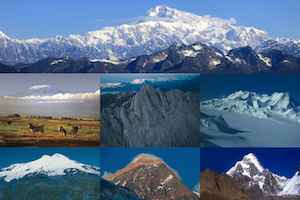 Seven Summits
Seven SummitsClimbing the Seven Summits - even with top guides - requires a wide array of mountaineering skills and knowledge. AAI's Seven Summits training course is based on a phased approach that prepares you for the upcoming climbs in your progression. In addition to giving you a
solid grasp of all the fundamental tools and techniques of the mountaineer, the course provides intensive preparation for cold, altitude, and expedition conditions.
- Location:North Cascades, WA
- Season:September - May & January - April
- Length:Varies
- Cost:Phase 1: $2445; Phase 2: $2880; Phase 3: $2820
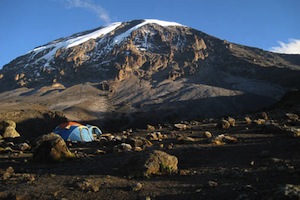 Kilimanjaro, as seen from Karangu Camp (13,000') on the Machame Route. Shawn Olson
Kilimanjaro, as seen from Karangu Camp (13,000') on the Machame Route. Shawn OlsonKilimanjaro is among the most diverse and rewarding of the world's great climbs. This iconic peak provides the experience of a lifetime. Join us for a journey to the roof of Africa, experience local cultures, wildlife viewing, and a high altitude trek to the top of one of the most memorable of the Seven Summits.
- Location:Tanzania, East Africa
- Season:June - February
- Length:10 Days, Climb only; 13 Days, Climb and Safari
- Cost:$4950 Climb Only; $7975 Climb and Safari
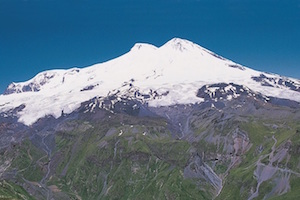 Elbrus from Mt. Cheget. The highpoint on the left is the higher west summit. Guy Cotter
Elbrus from Mt. Cheget. The highpoint on the left is the higher west summit. Guy CotterCrowning the great geographic and cultural divide between Europe and Asia, 18,510-foot Mt. Elbrus is one of the world's coveted "Seven Summits." The mountain is heavily glaciated, but its slopes are of moderate angle, making it a suitable climb for those with basic alpine skills and an interest in high altitude climbing. Added attractions on this expedition are the visit to Moscow and cultural experiences in the Caucasus.
- Location:Caucasus Range, Russia
- Season:May, July and August
- Length:11 to 14 days
- Cost:Starting at $6000
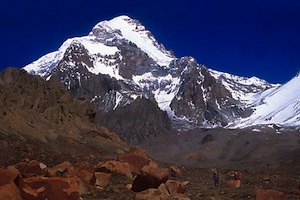 Aconcagua's Polish Glacier descends from the summit diagonally right. Andy Bourne
Aconcagua's Polish Glacier descends from the summit diagonally right. Andy BourneStanding at a height of 22,842 feet (6962 meters), Aconcagua is the highest mountain in the Americas and the second highest of the Seven Summits. AAI offers both non-technical and technical climbing routes to the summit that avoid the most heavily used camps, preserving some of the wilderness experience of this massive peak.
- Location:Argentine Andes
- Season:December - February
- Length:21-days
- Cost:$7,150
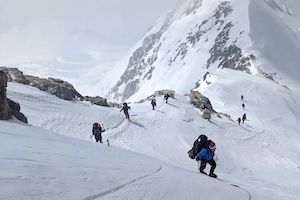 AAI climbers ascending the 16,000' ridge on Denali's West Buttress. Photo: George Bieker
AAI climbers ascending the 16,000' ridge on Denali's West Buttress. Photo: George BiekerThe American Alpine Institute has been guiding Denali since 1980 and has an outstanding record of safety and summit success. This guided climb ascends the beautiful West Buttress route, first pioneered by Bradford Washburn in 1951. This is no ordinary mountain trek though. Instead, this is a demanding expedition across high and steep glaciers in arctic air to the tallest point in North America, to the top of one of the coveted "Seven Summits." There is no doubt. This is the adventure of a lifetime!
- Location:Alaska Range
- Season:May - June
- Length:21 days
- Cost:$12,450
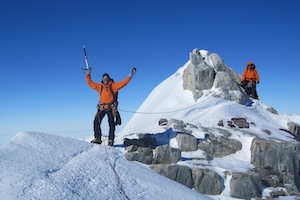 Mt. Vinson Base Camp
Mt. Vinson Base CampThe ascent of Mt. Vinson is not a technical one, nor is its altitude, at 16,050 ft (4892m) particularly challenging compared to the other Seven Summits. The peak's location in Antarctica's Sentinel Range, however, is where the challenge, and the reward lies. The Sentinel Range in the Ellsworth Mountains is the most remote on the world, and the weather conditions around the massif can be extreme--this is an expedition for those who desire to explore the majestic interior of Antarctica.
- Location:Ellsworth Mountains, Antarctica
- Season:November - January
- Length:16 days
- Cost:$52,000
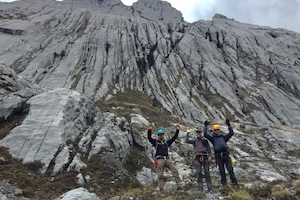 Climbers at the base of the Carstensz Pyramid
Climbers at the base of the Carstensz PyramidAt 16,024 feet tall, the Carstensz Pyramid is the expedition for climbers excited about ascending technical rock terrain that is unlike any of the other Seven Summits. Rising out of the heart of a jungle and flanked by glaciers, this peak is also the most remote of the Seven Summits and is the highest mountain in Indonesia and on the Australasian continental plate. This expedition offers an experience in a stunning environment that redefines adventure, as well as immersing climbers in the rich culture of Papua New Guinea.
- Location:Papua New Guinea
- Season:February-March, August-October
- Length:11 days
- Cost:$26,900
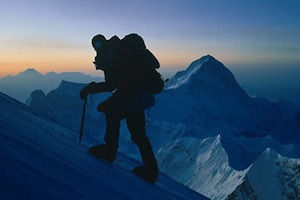 High on Everest with Makalu in the background. Guy Cotter
High on Everest with Makalu in the background. Guy CotterThe joint American Alpine Institute Everest climb benefits from the combined experience of two of the world's leading pioneers in high-altitude guiding. The Institute brings the most extensive high altitude guiding record in the world to the guided expeditions with the highest success rate on Mt. Everest.
- Location:Khumbu Himalaya, Nepal
- Season:April - June
- Length:8-9 weeks
- Cost:$83,000